History Of Garden’s Of Eagan
For A Very Long Time: The Dakota People Lived In the Area Now Called Eagan.
A culturally rich society, the Dakota people hunted, fished, wild-gathered, and grew crops including maize and squash. Canoes were a major form of transportation on the many rivers in the land they called Mini Sota Makoce. In 1862, simmering tensions betwee n indigenous Dakota and white settlers culminated in the violent, six-week-long U.S.-Dakota War which ended with the execution of 38 Dakotas. In April of 1863 the Dakota and Winnebago peoples were forcefully removed to South Dakota, precipitating the near destruction of the area’s native communities . Read more.
n indigenous Dakota and white settlers culminated in the violent, six-week-long U.S.-Dakota War which ended with the execution of 38 Dakotas. In April of 1863 the Dakota and Winnebago peoples were forcefully removed to South Dakota, precipitating the near destruction of the area’s native communities . Read more.
1855: Diffley Preemption of Land In Eagan
William and Katherine Diffley preempted 160-acres in Eagan, Minnestoa and built the original Diffley homestead on the corner 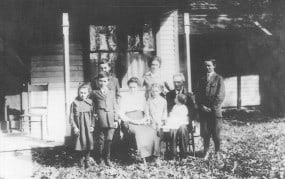 of Dodd and Diffley Road.
of Dodd and Diffley Road.
1855–1991: Five Generations of Diffleys
The extended Diffley family lived on the Diffley land in Eagan, MN. Crops raised included dairy, small grains, hay and vegetables for the Twin Cities markets.
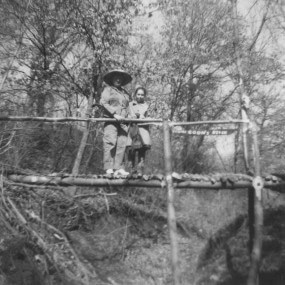 1950s and 60s: Martin’s Childhood
1950s and 60s: Martin’s Childhood
As a child, Martin worked for neighbor truck farmers and grew and marketed vegetables alongside Highway 3 in Eagan, MN. His uncles and neighbors taught him about soil building crops, rotational grazing, and the human and animal health problems associated with agricultural chemicals. His father ran a barber shop on the Diffley land.
1960s and 70s: Atina’s Childhood In Rural Wisconsin
Atina’s family grew or wild-harvested, and canned or froze most of their fruits and vegetables. Sweet corn was sold alongside the road.
 1972: Organic Certification
1972: Organic Certification
Organic Growers and Buyers Association (OGBA) , a Minnesota non-profit, formed to link organic farmers and buyers.
1973: Gardens of Eagan begins
Martin took responsibility for the family land and began growing organic vegetables, marketing them at the Minneapolis farmers market. His early organic systems were based on his uncles and neighbors advice and experimentation with soil-building crops and alternative pest and disease management.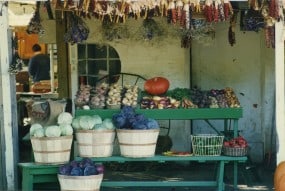
1974: Diffley’s Gardens Of Eagan Received Organic Certification.
Martin began the Gardens of Eagan wholesale delivery route serving natural food co-ops in Minneapolis and Saint Paul.
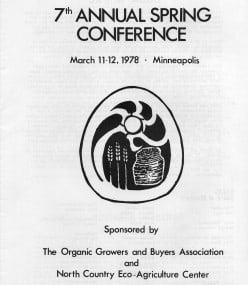 1974–1990: OGBA Involvement
1974–1990: OGBA Involvement
Martin’s volunteered with OGBA as a field inspector, a certification committee advisor, a board member, chair of OGBA, and worked with the participatory committee and the state to develop Minnesota Organic standards.
Late 1970s: Roadside Stand
Martin opened the Gardens of Eagan roadside stand, then called a “Community Market.”
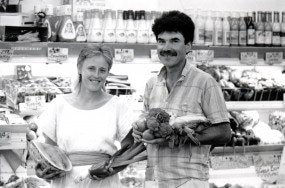 1985: Minnesota Passed State Organic Laws.
1985: Minnesota Passed State Organic Laws.
1985: Atina Joined Martin As Farm, Business, And Life Partner.
1989: The Alar Scare
CBS news, 60 Minutes, broadcast a story highlighting concerns about Alar. Sales of organic apples and organic products in general, soared. While this was a brief boon for organic, the long term consequences were grim as unscrupulous marketers slapped organic labels on non-organic product. The credibility of organic was in peril. The “Alar Scare,” drove the organic community to seek federal regulation. The result was the passage of the Organic Foods Production Act of 1990.
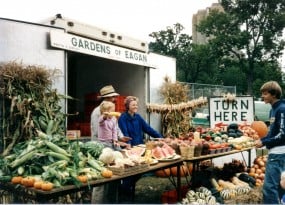 1980s–present. Organic and Entomology Research.
1980s–present. Organic and Entomology Research.
The Gardens of Eagan hosts professors and students from the U of M, and staff from the MN. Departments of Agriculture and Health. Examples of projects include, Dr. David Andow studied Trichogramma wasps as biological control of corn borers on sweet corn; Dr. Dharma Sreenivasam researched the impact of a lady beetle on potato bug larvae; the Gardens of Eagan provided produce and access to fields for the study “Microbiological Safety of Organic Fruits and Vegetables” by Dr. Francisco Diez-Gonzalez.
1989-1993: Suburban 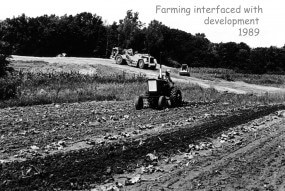 Development
Development
The Diffley land was developed to build Pinewood Elementary School, and Autumn Ridge and Hawthorne Woods housing development. During this period Atina and Martin farmed on eighteen different properties within a thirty-mile radius to meet their production needs with certifiable organic land.
1991: A New Home For Gardens Of Eagan Found
Atina and Martin purchased their own land in Eureka Township and began the 36-month process of transition to organic. The transition process included, taking the land out of production, covering open waterways with grass, reducing the “weed seedbank” stored in the soil, creating small fields with adjoining biological diversity habitat, and feeding the microbial life of the soil by planting soil-building crops. They continued to grow their vegetable crops on 18-rented fields until the new land was ready for organic certification.
1991: TURN HERE SWEET CORN | The Video
When the Diffley’s 5th-generation family land was bulldozed for suburban development they collaborated with filmmaker Helen De Michiel to create Turn 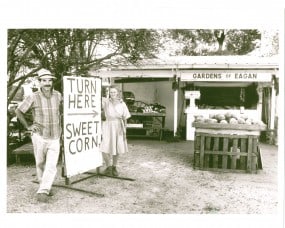 Here Sweet Corn, a documentary addressing the rural-suburban interface and the loss of agricultural land. Much of the video is filmed at the Gardens of Eagan and includes organic farming information. The Diffleys also arranged and facilitated film interviews with other farmers, family, and community members. The film aired nationally on PBS, locally at film venues, and is available for purchase on the Internet. The Land Stewardship Project presented Turn Here Sweet Corn extensively in their urban-sprawl advocacy work around the state and the Diffleys presented on the importance of land preservation.
Here Sweet Corn, a documentary addressing the rural-suburban interface and the loss of agricultural land. Much of the video is filmed at the Gardens of Eagan and includes organic farming information. The Diffleys also arranged and facilitated film interviews with other farmers, family, and community members. The film aired nationally on PBS, locally at film venues, and is available for purchase on the Internet. The Land Stewardship Project presented Turn Here Sweet Corn extensively in their urban-sprawl advocacy work around the state and the Diffleys presented on the importance of land preservation.
1994: Gardens of Eagan Moved
Atina and Martin moved to their land in Eureka Township and began vegetable production there.
1994-2005. Organic Farming Experiences Record Growth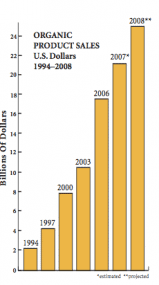
National organic sales grew between 18 and 25 percent annually. At the Gardens of Eagan, yields and quality increased each year as the soil health continually improved. Chart from OTA.
October 2002: Full Implementation Of The National Organic Program Goes Into Effect.
After 12 years of NOSB meetings, multiple organic standards drafts, and 275,000 public comments, the Final Rule for the National Organic Standard was published and fully implemented. We now have a national standard for organic. Organic History.
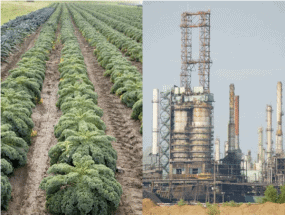 2006. “Organic Appendix for the Agricultural Impact Mitigation Plan.” (AIMP)
2006. “Organic Appendix for the Agricultural Impact Mitigation Plan.” (AIMP)
When the Diffleys received notice that the MinnCan pipeline proposed to bisect the Gardens of Eagan they intervened as parties in the route proceeding. Party status permitted the Gardens of Eagan to make discovery requests, file expert evidence, and conduct cross-examination in a contested administrative hearing. Through this legal process they protected their own farm and addressed the unique mitigation needs of other organic farmers.
Pipelines and power lines have impinged upon agricultural land for decades. Minnesota state law recognizes this risk and requires that mitigation of impacts on agricultural land be considered in routing energy infrastructure. However, organic farms present a new and unique conflict with pipeline and power-line land use. Construction and soil compaction activities can seriously impair production in farming systems dependent on soil characteristics for fertility; the loss of beneficial insect habitat can impact pest and disease levels; and the use of fuels, herbicides, and other chemicals in the process of construction or right-of-way maintenance can result in decertification of organic farms.
The Diffleys developed and filed evidence establishing the nature of organic production and the unique vulnerability of the Gardens of Eagan vegetable farm to the harms resulting from a crude oil pipeline. They included the Minnesota Department of Agriculture in negotiations, resulting in State support to protect organic agriculture in an appendix to the AIMP. In addition to legal advocacy, the Diffleys worked with consumers and other stakeholders. As a result of outreach and organizing, over 4,500 public comments were received supporting protection of the Gardens of Eagan organic farm and protection of MN’s organic farms from the impacts of the proposed crude oil pipeline.
As a result of these efforts, the Minnesota Public Utilities Commission included in the permit for the pipeline what is believed to be the first organic agriculture mitigation plan in the country applicable to energy infrastructure. This mitigation plan provides rights and protections for any affected organic farm in Minnesota. Since the implementation of the Organic Appendix to the AIMP in the MinnCan case, organic mitigation has been applied to other projects in Minnesota, including the Enbridge Pipeline, the Northern Natural Gas Pipeline, and the Cap-X2020 transmission line, and other jurisdictions in the U.S. have begun to require that agricultural impact mitigation plans provide protection to organic agriculture. Click to read pipeline documents and articles.
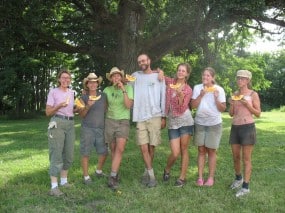 January 2008: Sale of Gardens Of Eagan Name
January 2008: Sale of Gardens Of Eagan Name
The Wedge Community Co-op purchased the Gardens of Eagan name and equipment and began leasing the farmland for organic vegetable production. The Wedge-owned- and operated Gardens of Eagan is run by farm manager, Linda Halley, along with Mike Leck, crop and harvest manager, Susan Quigley, pack shed and plant manager, John Middleton, operations field manager, Julio Lozano, harvest lead, and a talented, earnest crew. They continue to provide organic produce to the local community. In addition to managing the farm, the Wedge Co-op has started the Organic Field School at Gardens of Eagan. Atina and Martin continue to live on the land and focus their outreach through their consulting business Organic Farming Works LLC.
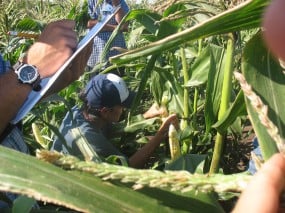 2008- 2013 Participatory Plant Breeding – Organic Sweet Corn Breeding
2008- 2013 Participatory Plant Breeding – Organic Sweet Corn Breeding
Martin is presently working with the U of W-Madison (Dr. Bill Tracy) and the Organic Seed Alliance (Dr. John Navazio.) to develop a sweet corn variety uniquely adapted to the climate and field conditions at Gardens of Eagan that combines good cold soil germination and vigor with great flavor, sweetness, standability, and resistance to common rust and corn smut. The long-term objective includes distribution of the open-pollinated cultivar as Open Source stock.
The Future.
At the end of the 2012 growing season, the Wedge Co-op will move the Gardens of Eagan to their own farmland. The Diffleys will use their land for organic research and seed breeding, education, and mentoring and incubation of future organic farmers.

